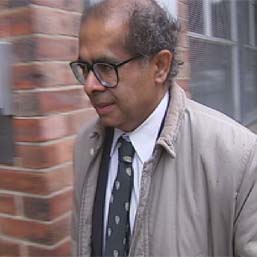G20 pathologist suspended for three months
The forensic pathologist who botched the Ian Tomlinson G20 post mortem is to be suspended from further practice for three months by the General Medical Council (GMC).
Dr Mohammed Freddie Patel was found guilty of serious misconduct, irresponsible behaviour and brining the profession into disrepute in three other investigations into suspicious deaths.
In its ruling today, the GMC said it had to maintain public confidence in the profession, and Dr Patel had made no expression of regret in any of the case where his performance was deemed deficient.
The GMC said his shortcomings in one case were very serious. The suspension will come into effect in 28 days to allow the pathologist to complete reports into cases he is currently working on.
The GMC also decided that the pathologist should be barred from carrying out any post mortems in cases of suspicious deaths and be prevented from acting for the defence in homicide cases.
The 63-year-old had already been suspended from the Home Office register of forensic pathologists over his handling of the Tomlinson case but is still carrying out post mortems for various coroners in London.
Dr Patel was said by the GMC panel to have failed to identify marks on the body of a five-year-old girl which suggested she had been violently attacked prior to her death.

The panel said Dr Patel’s conduct was “irresponsible” and not of the standard expected of a Home Office pathologist.
He was also said to have behaved in a way which was liable to bring the profession into disrepute when he changed the cause of a woman’s death to satisfy her family.
Richard Davies, the chairman of the GMC panel, said suspension was necessary as Dr Patel’s shortcomings had been “very serious”.
“The panel considers it to be most important that the public be assured that the independence of professional forensic pathologists can be relied upon and that neither those working in the specialty, nor anyone else, should gain the impression that the misleading conduct for which you have been criticised will be treated other than with substantial seriousness,” he said.
“For these reasons, the panel has determined that a period of suspension in your registration is appropriate in your case.
At the end of his three months suspension, Dr Patel will face a fitness to practise panel. He was also ordered to improve his knowledge of the law and refer cases to other pathologists for peer review.
Dr Patel has been a forensic pathologist for over thirty years but his competence was challenged when the Metropolitan Police complained after he decided that the first victim of a serial murderer who became known as the Camden Ripper had died from natural causes.
In a separate case not considered by the hearing, Dr Freddy Patel ruled that Ian Tomlinson died of a heart attack at the G20 protests.
But two other pathologists later separately concluded that Mr Tomlinson – who had been pushed by a police officer – died of internal bleeding as a result of blunt force trauma, in combination with cirrhosis of the liver.
The failure of the three pathologists to all agree led to the director of public prosecutions ruling that the policeman in question would not face any charges.
Speaking after the GMC announced their decision to suspend Dr Patel, Mr Tomlinson’s widow Julia said: “Today’s decision confirms that the GMC do not think Patel is fit to practice and has been an obstacle to the truth in a number of cases.
“It is heartbreaking to us that he was involved in Ian’s case and the real question for our family is why – with his track record – he was appointed in the first place.
“We look ahead to the inquest now and hope that we will finally get some answers.”
Speaking on behalf of his client after the hearing, Dr Patel’s solicitor, Simon Gomersall, said: “It would be inappropriate for Dr Patel to comment at this stage given the possibility that he may be asked to give evidence by the coroner at the inquest into Ian Tomlinson’s death. Dr Patel also needs time to consider the GMC’s decision with his advisors.”